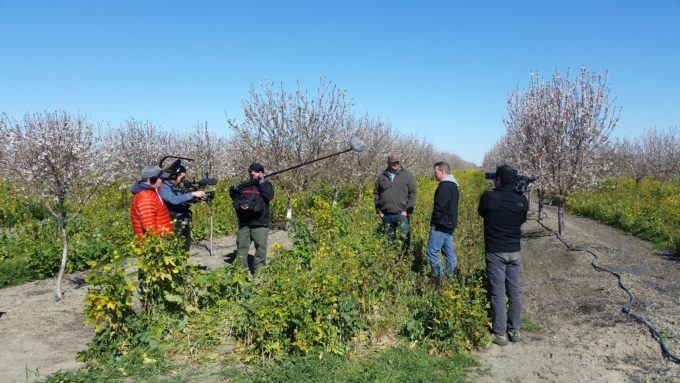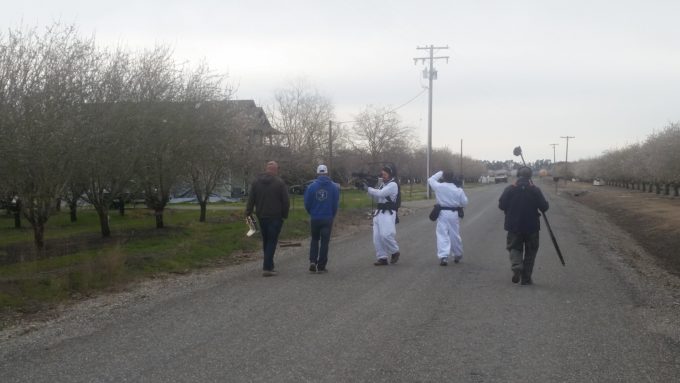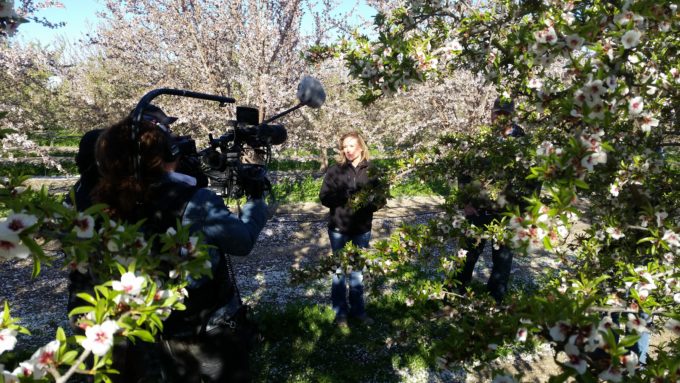Earlier this year I had the opportunity to take part in the filming of a documentary by the Bee Understanding Project and it turned out to be a very fun and informative experience! The point of the film was to show the relationship between the almond and beekeeping industries through a job swap, where each participant, almond grower and beekeepers, could better see the other’s perspective. Unlike many other recent honey bee documentaries, this film does not portray commercial beekeepers or almond growers as the bad guys, but rather is fair in describing the challenges each of them faces as our agricultural systems become more industrialized. This short film took an optimistic approach and featured the collaborative efforts of beekeepers and almond growers working toward a more sustainable future.

Beekeepers Russell Heitkam and Jason Miller worked together with Almond growers Ben King and Blake Davis. In addition, the project also enlisted Bo Christie, a Pest Control Advisor specializing in almond pests and treatment, and myself as a honey bee health consultant and a Tech Team member for the Bee Informed Partnership. We all hit it off very well from the start and enjoyed sharing our expertise. It was entertaining watching the film crew try to get into bee suits and work around the bees. They were all good sports, and although no one got stung in the end, it was an experience they won’t soon forget!

I learned a lot from this experience. One of my favorite parts of the job swap was going into the orchard and really looking closely at the trees. I spend a lot of time in orchards while looking at bees but it’s easy to take the trees for granted and stop noticing them. While we were filming, Northern CA experienced a very unusual cold snap that had all the growers scrambling to protect their crops. Bo Christie showed us how to cut the tiny almonds in half and look for the dark frost-damaged tissue.
One of the biggest threats to the almond crop is the orange worm, which lives in the “mummies,” or nuts that weren’t shaken off the tree the previous fall. We all broke up in search of a worm to film, which involved running around the orchard looking for mummies, cracking them open, and checking for signs of the larvae burrowed in the nut. I’m happy to say I found the worm that made its star appearance in the film!

Another favorite moment was seeing the beautiful cover crops of mustard and daikon radish blooming in the orchard lanes. Ben King pulled up a radish with a root system bigger than his forearm, which demonstrated well why this particular crop is such a great plant for improving soil aeration. It’s especially amazing considering how hard, compacted, and impermeable orchard soil tends to be.
After the filming was over I continued to think about the issues everyone brought up, but the one missing piece that wasn’t really discussed in the film is the consumer. The average shopper is starting to think more about how their food is grown as people make the connection between our food systems, human health, and the health of our environment. I think it would be great to have a “bee-safe” certification program for almonds and other produce, similar to the Salmon-safe label being used on wine, beer, and eggs (https://salmonsafe.org/get-certified/). To get certified, growers would have to demonstrate they are organic or follow strict pesticide guidelines, and are planting cover crops or additional forage.
Overall, the Bee Understanding Project film covered the topic in a clear, entertaining way. The aerial drone footage of bees being loading and shipped off was my favorite part, we usually don’t get that perspective! The full documentary can be seen here on YouTube: https://www.youtube.com/watch?v=EbGJ1I1e29s